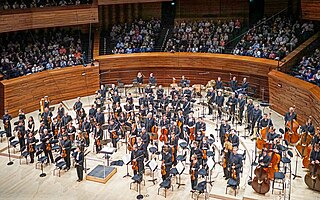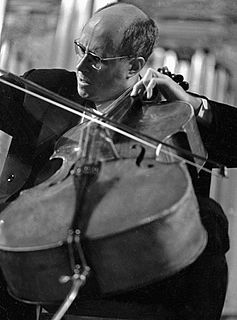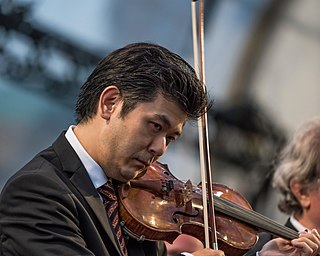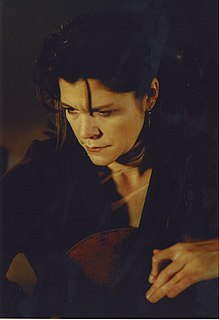Related Research Articles

Pascal Georges Dusapin is a French composer. His music is marked by its microtonality, tension, and energy.

The Violin Concerto No. 3 in B minor, Op. 61, by Camille Saint-Saëns is a piece for violin and orchestra written in March 1880. Saint-Saëns dedicated the concerto to fellow composer-virtuoso Pablo de Sarasate, who performed the solo part at the premiere in October 1880 in Hamburg.

The Seoul Philharmonic Orchestra (SPO) is one of the prominent orchestras in South Korea which is based in Seoul. Founded in 1948, it is one of the oldest orchestras in South Korea. Its first foreign tour came on a 1965 trip to Japan, followed by performances in Southeast Asia in 1977, the United States in 1982, 1986, and 1996, a 1988 tour of Europe before the Seoul Olympics that year, and a 1997 performance in Beijing. The Philharmonic is an incorporated foundation since 2005.
Myung-whun Chung is a South Korean conductor and pianist.

The Orchestre Philharmonique de Radio France is a French radio orchestra, affiliated with Radio France. The orchestra performs principally at the auditorium of the Maison de la Radio in Paris, along with several concerts at the Philharmonie de Paris.
The Orchestre Philharmonique Royal de Liège (OPRL) is a Belgian symphony orchestra, based in Liège. The primary concert venue and administrative base of the OPRL is the Salle Philharmonique de Liège. The OPRL receives financial support from the Fédération Wallonie-Bruxelles, the City of Liège, the Province of Liège, the Région wallonne, and the Loterie Nationale.
Pascal Pons, born on 9 November 1968 in Nice, is a French percussionist.

The Orchestre national des Pays de la Loire (ONPL) is a French symphony orchestra based in Angers and Nantes. The orchestra receives support from the Regional Council of the Pays de la Loire, the French Ministry of Culture, the municipalities of Nantes and of Angers, and the General Councils of Loire-Atlantique, Maine-et-Loire, and La Vendée.

Carmen: Duets & Arias is an album released in 2010 by Italian tenor, Andrea Bocelli. The album is a collection of arias of Georges Bizet's opera Carmen, including duets with Welsh bass-baritone, Bryn Terfel, Russian mezzo-soprano Marina Domashenko, and Italian soprano Eva Mei, from the French opéra comique.
The Victoires de la musique classique are an annual French classical music award event founded in 1986. The awards are the classical equivalent of the popular music awards Victoires de la Musique and the Victoires du Jazz. Most of the awards are for actual performers, orchestras, composers, etc. as opposed to the Diapason d'Or given to recordings, though there is an Enregistrement français de musique classique de l'année.

Renaud Capuçon is a French classical violinist. Since late 2016 he has been teaching at the Royal Northern College of Music.

Tout un monde lointain... is a concertante work for cello and orchestra composed by Henri Dutilleux between 1967 and 1970 for Mstislav Rostropovich. It is considered one of the most important 20th-century additions to the cello repertoire and several major cellists have recorded it. Despite the fact that the score does not state that it is a cello concerto, Tout un monde lointain... has always been considered as such.
L'arbre des songes is a violin concerto written by Henri Dutilleux between 1983 and 1985. It is dedicated to Isaac Stern.
Alexander Gurning is a Belgian pianist, composer and improviser.

Daishin Kashimoto is a Japanese classical violinist. Since 2009, he has been the first concertmaster of the Berlin Philharmonic.
Jonathan Stockhammer is an American conductor based in Germany.
Pascal Rophé is a French conductor. He is currently music director of the Orchestre national des Pays de la Loire.
Aufgang (Ascent) is a violin concerto written by the French composer Pascal Dusapin for Renaud Capuçon between 2008 and 2011. The violinist premièred it in 2013 in Cologne. He subsequently performed it in Seattle, London and in Switzerland, before recording it with Myung-whun Chung conducting the Orchestre Philharmonique de Radio France in 2015.
Jean-François Heisser is a French classical pianist.

Sonia Wieder-Atherton is a Franco-American classical cellist.
References
- 1 2 3 4 5 6 7 8 9 10 Musicweb-International Review, Hubert Culot
- 1 2 Grammophone CD Review, Arnold Whittall
- 1 2 "Pascal Dusapin: Reverso (2005–2006) Solo No. 6 for Orchestra" (in French and English). IRCAM.
- 1 2 3 4 5 6 "Riding Herd on the Wild Orchestra", The New York Times CD Review, Steve Smith, May 13, 2010
- 1 2 Reverso, Uncut, Morning in Long Island CD Review, Grammophone, Richard Whitehouse
- 1 2 3 Dusapin: Seven Solos for Orchestra, The Guardian, Andrew Clements, April 15, 2010
- 1 2 Découvrir la Musique Contemporaine, Thierry Vagne, November 1, 2013 (in French)